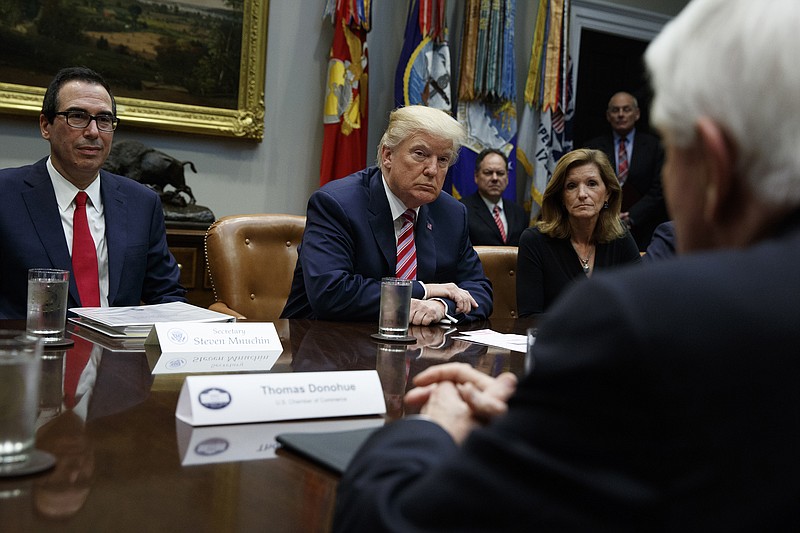Every bad political idea starts with a false premise. The Affordable Care Act lie that we had an awful health care system and government could fix it and save families "$2,500 a year" spawned the Obamacare disaster.
The Bush-era intelligence agencies' fibs were that Saddam Hussein had weapons of mass destruction and we had to stop him. Thousands of lives and countless wounded later, we rule the rubble after our $1 trillion social studies lesson. With that lie and post-9/11 hysteria came the Patriot Act, which sacrificed freedoms (not patriotic). It created the TSA ("Thousands Standing Around"), the Department of Homeland Security and the FISA court spying on U.S. citizens. Result: the Mueller Witch Hunt.
View other columns by Ron Hart
Displaying his liberal side, Trump agreed to consider stricter gun controls and yielded to the pandering populist economic idea of tariffs. Tariffs go against GOP doctrine. The Southern evangelicals quickly forgave Trump for cavorting with porn star Stormy Daniels since the economy is roaring and they are getting raises. But if Wal-mart raises the price of a bass boat because of his aluminum tariffs, the honeymoon might be over.
Americans still love Trump's border wall and immigration policy. We are tired of Guatemalans coming to America and taking the low-paying jobs of our Mexicans. We did not fight the Civil War for this; our nation fought it to determine forever that slaves would no longer do the menial jobs in America and that illegal immigrants would.
But Trump continues to defy conventional wisdom of "the body politic," which would say he'd be dead by now. He's the Keith Richards of politics. The reason? Poly-tics defines Washington, D.C., by meaning "many ticks." Trump is rich; he is not beholden to the GOP, NRA or any predetermined dogma. He comes to D.C. with no ticks on him, if you don't count Jared Kushner. America loves that.
Trump's tariffs have also angered our allies. The British prime minister released an official statement that the Brits were "very disappointed," harsh language for them. "Very disappointed" is their highest security threat level and punishment for terrorist bombers, right ahead of "Tsk, tsk" and "blimey."
A casualty of the tariff debate was free-trader Gary Cohn. I worked with him at Goldman Sachs, and Trump lost a good man. Trump had tariff advocate and White House Trade Adviser Peter Navarro battle it out "The Apprentice-style" with Cohn in his office. He likes that "team of rivals" approach. Let two people like Omarosa and Gary Busey compete, and you get the best outcome. Next, Trump plans to put a humidifier and a dehumidifier in his office and let them battle it out. And that, my friends, will determine our humidity going forward.
Tariffs like this one, favoring some U.S. industries over others, are crony capitalism and an industrial swing-state political ploy. Tariffs are more popular in Wisconsin than Aaron Rodgers jerseys. In some degree, steel tariffs have been imposed by every president since Nixon - and then adjusted. They are invariably kickbacks to unions and their executives at the expense of employees of other non-protected industries and every consumer in America, because tariffs are inflationary.
Trump's risk is that protectionism, a fast-growing economy, and loss of cheap illegal immigrant labor are all inflationary. They can hurt; just ask Jimmy Carter.
Many believe the Civil War was fought over the South's secession after Abraham Lincoln imposed the Morrill Tariff Act of 1861. Slavery would have ended in due course, and the Civil War (and a half million American deaths) might have been avoided with diplomacy - and if South Carolinians at Fort Sumter had not gotten jumpy and been so dang trigger happy.
Yet, in a recent poll Lincoln was voted our best president ever (and probably their favorite car) by political science professors. College professors listed President Trump dead last: shocker! Lincoln fought unnecessary wars, bitterly divided our country along racial lines, provoked hatred from Democrats, imposed dangerous tariffs and made a leading actor of the day want to kill him. So tell me, how was he much different from Trump?
Contact Ron Hart at Ron@Ronald-Hart.com or @RonaldHart on Twitter.

